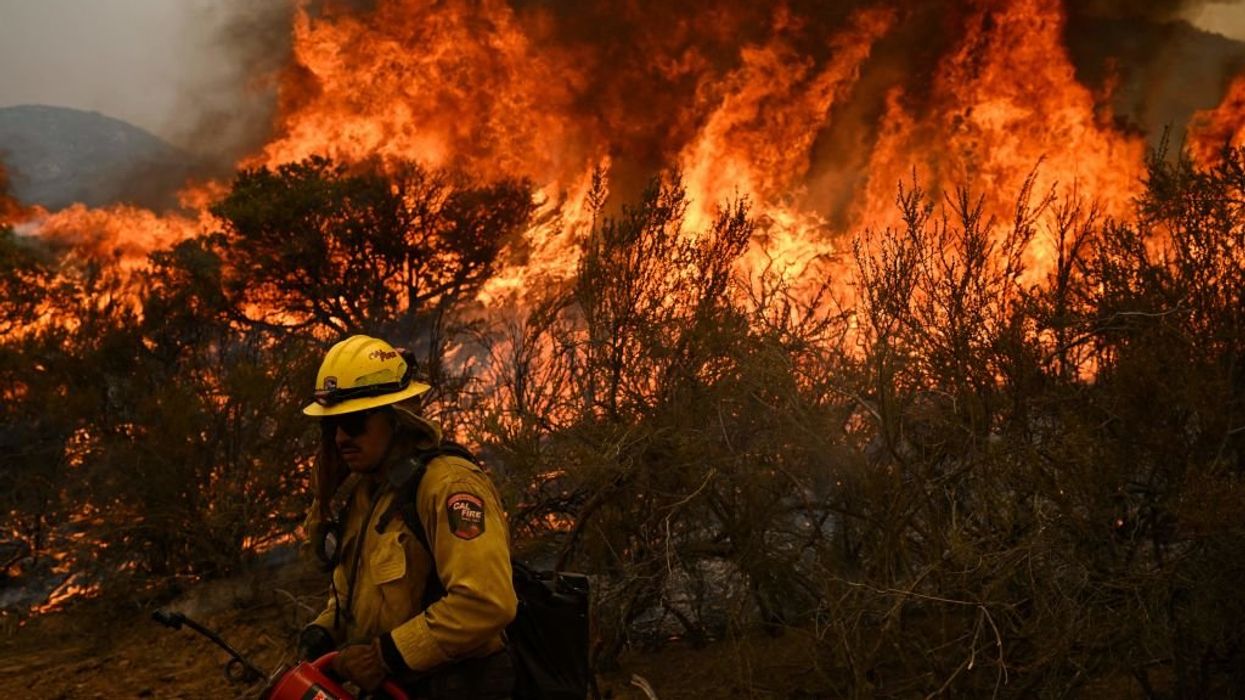
Photo by PATRICK T. FALLON/AFP via Getty Images

The esteemed scientific journal Nature published a scholarly article last week about alleged empirical relationships between supposedly man-made climate change and wildfire growth risks, quantified using machine learning. While the article advanced the usual conclusions about climate change predisposing certain regions — in this case, California — to wildfire conditions, the lead author then did something quite unusual.
Patrick T. Brown, lecturer at Johns Hopkins University and co-director of the Climate and Energy Team at the Breakthrough Institute, publicly admitted Tuesday that, like other scientists keen to have their work published, he "left out the full truth" in order to push "a narrative [he] knew the editors would like."
Brown's admission and corresponding explanation appear to suggest that those keen to "follow the science" may oftentimes be left filling their heads with alarmist agitprop rather than meaningful insights into the workings of the natural world.
Zeroing in on climate science in particular, Brown stressed that it "has become less about understanding the complexities of the world and more about serving as a kind of Cassandra, urgently warning the public about the dangers of climate change. However understandable this instinct may be, it distorts a great deal of climate science research, misinforms the public, and most importantly, makes practical solutions more difficult to achieve."
Brown noted on X after the publication of his article, "I am very proud of this research overall. But I want to talk about how molding research presentations for high-profile journals can reduce its usefulness & actually mislead the public."
The climate scientist flatly admitted in a polished version of his revelations in Bari Weiss' Free Press, "I wanted the research to be published in the highest profile venue possible. ... When I had previously attempted to deviate from the formula, my papers were rejected out of hand by the editors of distinguished journals, and I had to settle for less prestigious outlets. To put it another way, I sacrificed contributing the most valuable knowledge for society in order for the research to be compatible with the confirmation bias of the editors and reviewers of the journals I was targeting"
The climate scientist explained in his scholarly piece how he had elected not to "quantify" the most impactful factors behind the causes and exacerbation of wildfires, namely poor forest management and human ignitions.
Citing scientific analysis published in the Proceedings of the National Academy of Science of the United States of America years before climate alarmism hit its latest fever pitch, Brown retroactively underscored that over 80% of wildfires in the U.S. are started by human beings.
Just as with the hundreds of wildfires that ravaged northern Spain earlier this year, arsonists are believed to be responsible for the Greek wildfires that have killed at least 20 people. Seventy-nine arson suspects had been arrested in connection with the wildfires as of Aug. 25, reported the BBC.
ABC news reported Sunday that the largest wildfire in Louisiana history, which has destroyed tens of thousands of acres and has yet to be fully contained, was similarly the result of arson, according to the state's Department of Agriculture and Forestry.
Human ignition is not always the product of eco-terrorists and other such criminal lunatics. Sometimes, it is simply the result of incompetence.
TheBlaze previously detailed reports indicating the wildfires in Maui were most likely the result of the failures of Hawaiian Electric to maintain its equipment, to deal with the known and documented threat of fuel buildup in the form of flammable vegetation, and to pre-emptively shut down its power lines ahead of high-wind warnings.
Brown highlighted various articles concerning the Maui wildfires in various mainstream publications such as Bloomberg and the New York Times, which hyped climate change as a factor over human error and malfeasance.
"So why does the press focus so intently on climate change as the root cause?" wrote Brown. "Perhaps for the same reasons I just did in an academic paper about wildfires in Nature, one of the world's most prestigious journals: it fits a simple storyline that rewards the person telling it."
To reap the reward, the climate researcher knows "his or her work should support the mainstream narrative."
This entails in part that scientists entertain the possibility that expensive and bureaucratic "policies like the Inflation Reduction Act, aimed at reducing greenhouse gas emissions," might serve as viable remedies contra concrete and practical measures.
The climate scientist also noted a couple other tricks of the trade when it comes to fearmongering over the specter of climate change:
Like Blaze News? Bypass the censors, sign up for our newsletters, and get stories like this direct to your inbox. Sign up here!